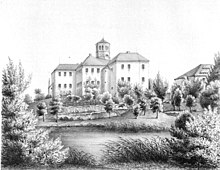Veit Dietrich Wagner
Veit Dietrich Wagner (* 1600 ; † March 1668 in Altenburg ) was a lieutenant colonel , civil servant and manor owner . He was Amtshauptmann the Saxon Office Schwarzenberg and the Office Grünhain . He also gained national fame as a co-founder of Johanngeorgenstadt .
Life
Under the reign of Elector Johann Georg I of Saxony, Veit Dietrich Wagner rose to lieutenant colonel of the Free Companies on foot and became governor of the two offices of Schwarzenberg and Grünhain in the Saxon Ore Mountains . At times Wagner was also deployed as a commandant in the city of Zwickau , where he directly experienced the events of the Thirty Years War and documented it in writing.
He owned the Sachsenfeld manor , where he kept a stag in the garden, which broke out of the kennel during the rutting season in 1655 and injured a farmer in neighboring Beierfeld . During this time there were long disputes with the hammer master Johann Rüdiger because of the purchase of the hammer mill in Sachsenfeld.
The letter from Elector Johann Georg I of Saxony, which he received on February 23/5. March 1654 in Annaburg and in it allowed the establishment of Johanngeorgenstadt, was addressed to the governor Wagner and reached him on March 2, 1654 in Schwarzenberg. At the end of July 1655 he personally took part in the border survey to the neighboring Kingdom of Bohemia.
Wagner died at Altenburg Castle in early March 1668 after being hit by a blow a few days earlier while attending the funeral of a deceased princess . He was buried on March 8, 1668 in the Brothers Church in Altenburg.
Web links
- Veit Dietrich Wagner in the digitized collections of the Berlin State Library ( digitized version )
- Veit Dietrich Wagner on the homepage of The Thirty Years' War in personal reports, chronicles and reports
Individual evidence
- ↑ Veit Dietrich Wagner on the homepage of The Thirty Years' War in personal reports, chronicles and reports
- ↑ Des perfect Teutschen Jäger Anderer Haupt-Part , 1724, p. 140.
- ↑ Trial file in the Saxon State Archives
- ^ Francke: founding history of Johanngeorgenstadt , p. 58f.
- ↑ Gustav Beyer: Beierfeld - History of its political, historical and cultural development . Evangelical Lutheran Parish office, Beierfeld 1923, p. 12 .
| personal data | |
|---|---|
| SURNAME | Wagner, Veit Dietrich |
| BRIEF DESCRIPTION | Electoral Saxon lieutenant colonel, governor and manor owner |
| DATE OF BIRTH | 1600 |
| DATE OF DEATH | March 1668 |
| Place of death | Altenburg |
